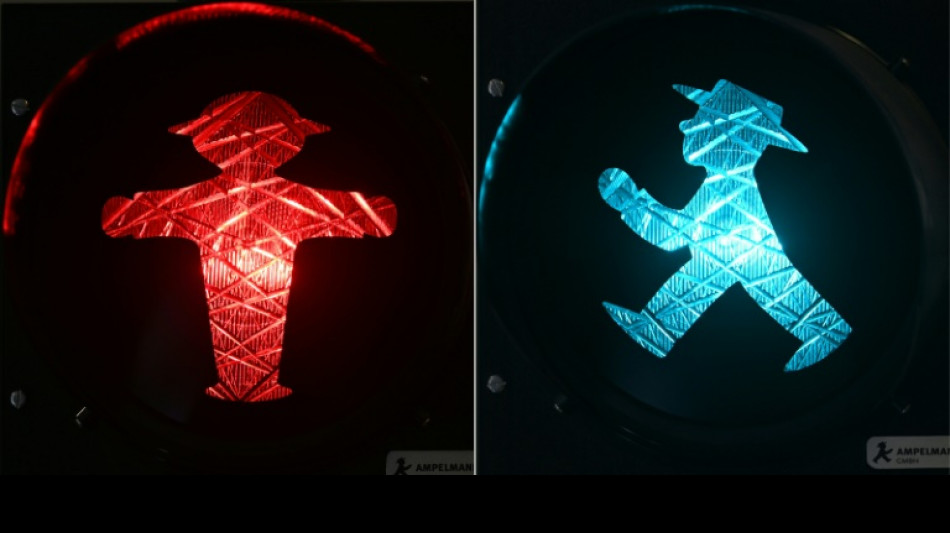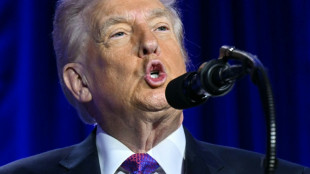
-
 Barca beat Mallorca to extend Liga lead
Barca beat Mallorca to extend Liga lead
-
Gyokeres lifts Arsenal nine clear as Man Utd pile pressure on Frank

-
 Late Guirassy winner for Dortmund trims Bayern's lead atop Bundesliga
Late Guirassy winner for Dortmund trims Bayern's lead atop Bundesliga
-
'Free the mountains!": protest in Milan over Winter Olympics

-
 Gyokeres double helps Arsenal stretch Premier League lead
Gyokeres double helps Arsenal stretch Premier League lead
-
BMW iX3 new era SUV

-
 Six Nations misery for Townsend as Italy beat sorry Scotland
Six Nations misery for Townsend as Italy beat sorry Scotland
-
Spain, Portugal face fresh storms, torrential rain

-
 Opinions of Zuckerberg hang over social media addiction trial jury selection
Opinions of Zuckerberg hang over social media addiction trial jury selection
-
Over 2,200 IS detainees transferred to Iraq from Syria: Iraqi official

-
 Norway's Ruud tops Olympic men's freeski slopestyle qualifying
Norway's Ruud tops Olympic men's freeski slopestyle qualifying
-
Czech qualifier Bejlek claims first title in Abu Dhabi

-
 French duo reach Shanghai, completing year-and-a-half walk
French duo reach Shanghai, completing year-and-a-half walk
-
Australian snowboarder James eyes elusive Olympic gold

-
 Sequins and snow: Eva Adamczykova makes Olympic return
Sequins and snow: Eva Adamczykova makes Olympic return
-
Vonn set for Olympic medal bid after successful downhill training

-
 Shepherd takes hat-trick as West Indies beat Scotland in T20 World Cup
Shepherd takes hat-trick as West Indies beat Scotland in T20 World Cup
-
Sausages will sell after thrill-seeker Von Allmen wins Olympic downhill

-
 Swiss racer Von Allmen wins first gold of Winter Olympics
Swiss racer Von Allmen wins first gold of Winter Olympics
-
'Wake up': Mum sparks comeback after scare for freeski star Gu

-
 Von Allmen wins men's Olympic downhill gold, first of Games
Von Allmen wins men's Olympic downhill gold, first of Games
-
First medals up for grabs at Winter Olympics

-
 Afghanistan captain Khan harbours dream of playing in Kabul
Afghanistan captain Khan harbours dream of playing in Kabul
-
Lindsey Vonn completes second Winter Olympics downhill training run

-
 Freeski star Gu survives major scare in Olympic slopestyle
Freeski star Gu survives major scare in Olympic slopestyle
-
Iran FM looks to more nuclear talks, but warns US

-
 Hetmyer's six-hitting steers West Indies to 182-5 against Scotland
Hetmyer's six-hitting steers West Indies to 182-5 against Scotland
-
After boos for Vance, IOC says it hopes for 'fair play'

-
 Thousands gather as Pakistan buries victims of mosque suicide attack
Thousands gather as Pakistan buries victims of mosque suicide attack
-
Lindsey Vonn completes second downhill training session

-
 US pressing Ukraine and Russia to end war by June, Zelensky says
US pressing Ukraine and Russia to end war by June, Zelensky says
-
Faheem blitz sees Pakistan avoid Netherlands shock at T20 World Cup

-
 Trump refuses to apologize for racist clip of Obamas as monkeys
Trump refuses to apologize for racist clip of Obamas as monkeys
-
Takaichi talks tough on immigration on eve of vote

-
 England's Salt passed fit for T20 World Cup opener
England's Salt passed fit for T20 World Cup opener
-
Spain, Portugal brace for fresh storm after flood deaths

-
 Pakistan bowl out Netherlands for 147 in T20 World Cup opener
Pakistan bowl out Netherlands for 147 in T20 World Cup opener
-
Pushed to margins, women vanish from Bangladesh's political arena

-
 Crypto firm accidentally sends $40 bn in bitcoin to users
Crypto firm accidentally sends $40 bn in bitcoin to users
-
Pistons end Knicks' NBA winning streak, Celtics edge Heat

-
 Funerals for victims of suicide blast at Islamabad mosque that killed at least 31
Funerals for victims of suicide blast at Islamabad mosque that killed at least 31
-
A tale of two villages: Cambodians lament Thailand's border gains

-
 Police identify suspect in disappearance of Australian boy
Police identify suspect in disappearance of Australian boy
-
Cuba adopts urgent measures to address energy crisis: minister

-
 Not-so-American football: the Super Bowl's overseas stars
Not-so-American football: the Super Bowl's overseas stars
-
Trump says US talks with Iran 'very good,' more negotiations expected

-
 Trump administration re-approves twice-banned pesticide
Trump administration re-approves twice-banned pesticide
-
Hisatsune leads Matsuyama at Phoenix Open as Scheffler makes cut

-
 Beyond the QBs: 5 Super Bowl players to watch
Beyond the QBs: 5 Super Bowl players to watch
-
Grass v artificial turf: Super Bowl players speak out


How East Germany's 'traffic light man' became a beloved icon
As Germany readies to mark 35 years since the Berlin Wall fell, one symbol of the former communist East has become an icon of reunification, seen by millions every time they cross a street.
East Germany's "Ampelmann" or pedestrian "traffic light man" is now instantly recognisable thanks to his chunky outline and wide-brimmed hat.
He almost disappeared along with East Germany in the years after the Wall fell on November 9, 1989, when many other symbols of the German Democratic Republic (GDR) were swept away.
Its polluting Trabant cars were soon headed for the scrap-heap, threadbare state-run shops gave way to Western brands, and grey prefabricated tower blocks got new licks of paint.
The Ampelmann almost went the same way, said Markus Heckhausen, a businessman in his 60s from the western German city of Tuebingen.
He remembered seeing the traffic lights featuring the Ampelmann often lying on the side of the road in the early days of reunited Germany.
Despite being a "Wessi" -- the sometimes pejorative nickname for West Germans -- Heckhausen took up the cause of the Ampelmann and spotted a commercial opportunity.
- 'Modern, body-positive' -
He started collecting the chunky lights to turn them into indoor lamps, while simultaneously launching an appeal for the Ampelmann to be saved on the streets.
The campaign struck a chord with many East Germans who felt "they were losing their identity" as their country was practically subsumed into its Western neighbour, said Heckhausen.
Not only was the Ampelmann saved in the East, but he also became a rare symbol from the GDR to be adopted in parts of the West, including in the former western sectors of long-divided Berlin.
The design was created in 1961 by the state's "transport psychologist" Karl Peglau and became something of a star within East Germany, even popping up in cartoons.
"I had the feeling he was always there during my childhood," said 53-year-old Torsten Foeste, who was born in the GDR town of Greifswald but now lives in Berlin.
Fons Hickmann, a graphic designer and professor at Berlin University of the Arts, said the Ampelmann's enduring popularity is down to his figure's lovable "imperfection".
"The back leg is a little too long, the front one a little too short, the whole figure is quite bulky," he told AFP.
"One could say that it's a very modern, body-positive symbol," he quipped.
- Money-spinner -
Peglau's aim was to create a cute, eye-catching figure which would be readily noticed, especially by children and the elderly, at a time when road accidents were on the rise.
"I think in essence it's such an important idea, saying that road traffic doesn't only belong to cars, but to others too, including pedestrians," said Hickmann.
While still keeping pedestrians safe, the humble Ampelmann has become a big money-spinner too, with Heckhausen following up on the lamps with mugs, T-shirts, soft toys and even USB sticks.
Not that Foeste minds the very capitalist incarnation of his childhood memory that Heckhausen has created: "I say congratulations to him, it's a super idea!"
Heckhausen was even able to convince Peglau to work with him on the products until the latter died in 2009.
Today the Ampelmann business makes millions of euros a year and employs around 80 people, said Heckhausen.
Particularly in Berlin, Ampelmann stores have become something of an obligatory stop for many on the tourist trail.
In one, visitor Petra from the western city of Essen hailed the "chic" design, adding: "I've already bought some schnapps glasses and fridge magnets".
B.Khalifa--SF-PST




